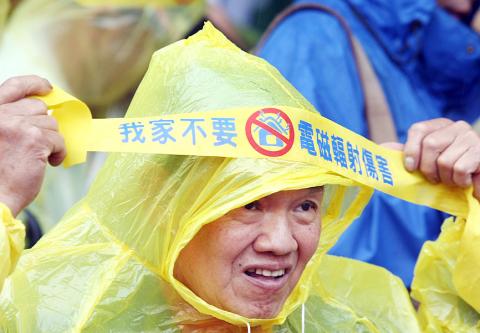Holding hand-written cloth banners and wearing weaved straw hats and raincoats, hundreds of people paraded through the rainy streets of Taipei yesterday afternoon in a protest calling for safe neighborhoods without the threat of exposure to electromagnetic and low-frequency radiation.
People from more than 50 self-help groups and non-governmental organizations called for a safe living environment with extremely low frequency (ELF) and electromagnetic radiation exposure levels below 2mG, which is the legal limit in government offices, they said.
Yan Hsiu-lan (顏秀蘭), who said she was a victim of long-term exposure to electromagnetic radiation in Wufeng Township (霧峰) in Greater Taichung, wept as she told the crowd how ELF exposure has impacted her life.

Photo: CNA
“I have to sleep in an aluminum box every night because my head aches,” she said, kneeling on the ground.
“Let’s ask our government not to joke around with our lives. The government uses our [tax] money to protect government employees from ELF, so why can’t we be protected as well? We are victims...” she said before breaking down in tears, unable to finish her sentence.
Chen Jiau-hua (陳椒華), the founder and chairperson of the Taiwan Electromagnetic Radiation Hazard Protection and Control Association, urged the government to stop using 833mG as a safety measure.
Chen said that figure is a reference level that could cause transient effects to the human nervous system, which the International Commission on Non-Ionizing Radiation Protection suggested as safety level for long-term (above four hours) exposure.
Other demands included providing the public with a source of inquiry when facing uncertainties; making public information about the harmful effects of ELF; amending the Environmental Protection Administration’s administrative regulation of ELF; and stating explicitly that long-term exposure to ELF above 3mG or 4mG may cause cancer.
The protesters also urged authorities to move facilities that emit electromagnetic radiation away from schools, hospitals and residential areas.
They said that electronic goods that emit electromagnetic radiation, such as mobile phones, should be labeled with a safety range and the specific absorption rate, which is the amount of energy absorbed by the body when exposed to a radio-frequency electromagnetic field.
The government should establish a system in which citizens can participate in the planning and location of ELF emitting facilities, they said.
The rally was attended by mostly elderly people, with some taking their grandchildren along. Shouting “833mG is unsafe, household safety level should be 2mG” and “I don’t want to be harmed by electromagnetic radiation,” the protesters marched through the busy streets near Taipei Train Station before arriving at Ketagalan Boulevard in front of the Presidential Office.
A skit showing residents crying for help while being trapped in a large fishing net was played out at the site, symbolizing the increasing threat of electromagnetic radiation.
Following a meeting between 10 representatives of self-help groups and an official from the Presidential Office’s petition section, Chen told the protesters that the official had promised to respond to their demands within a week.

Alain Robert, known as the "French Spider-Man," praised Alex Honnold as exceptionally well-prepared after the US climber completed a free solo ascent of Taipei 101 yesterday. Robert said Honnold's ascent of the 508m-tall skyscraper in just more than one-and-a-half hours without using safety ropes or equipment was a remarkable achievement. "This is my life," he said in an interview conducted in French, adding that he liked the feeling of being "on the edge of danger." The 63-year-old Frenchman climbed Taipei 101 using ropes in December 2004, taking about four hours to reach the top. On a one-to-10 scale of difficulty, Robert said Taipei 101

Nipah virus infection is to be officially listed as a category 5 notifiable infectious disease in Taiwan in March, while clinical treatment guidelines are being formulated, the Centers for Disease Control (CDC) said yesterday. With Nipah infections being reported in other countries and considering its relatively high fatality rate, the centers on Jan. 16 announced that it would be listed as a notifiable infectious disease to bolster the nation’s systematic early warning system and increase public awareness, the CDC said. Bangladesh reported four fatal cases last year in separate districts, with three linked to raw date palm sap consumption, CDC Epidemic Intelligence

US climber Alex Honnold left Taiwan this morning a day after completing a free-solo ascent of Taipei 101, a feat that drew cheers from onlookers and gained widespread international attention. Honnold yesterday scaled the 101-story skyscraper without a rope or safety harness. The climb — the highest urban free-solo ascent ever attempted — took just more than 90 minutes and was streamed live on Netflix. It was covered by major international news outlets including CNN, the New York Times, the Guardian and the Wall Street Journal. As Honnold prepared to leave Taiwan today, he attracted a crowd when he and his wife, Sanni,

Taiwanese and US defense groups are collaborating to introduce deployable, semi-autonomous manufacturing systems for drones and components in a boost to the nation’s supply chain resilience. Taiwan’s G-Tech Optroelectronics Corp subsidiary GTOC and the US’ Aerkomm Inc on Friday announced an agreement with fellow US-based Firestorm Lab to adopt the latter’s xCell, a technology featuring 3D printers fitted in 6.1m container units. The systems enable aerial platforms and parts to be produced in high volumes from dispersed nodes capable of rapid redeployment, to minimize the risk of enemy strikes and to meet field requirements, they said. Firestorm chief technology officer Ian Muceus said